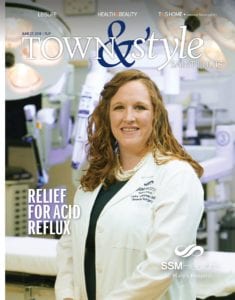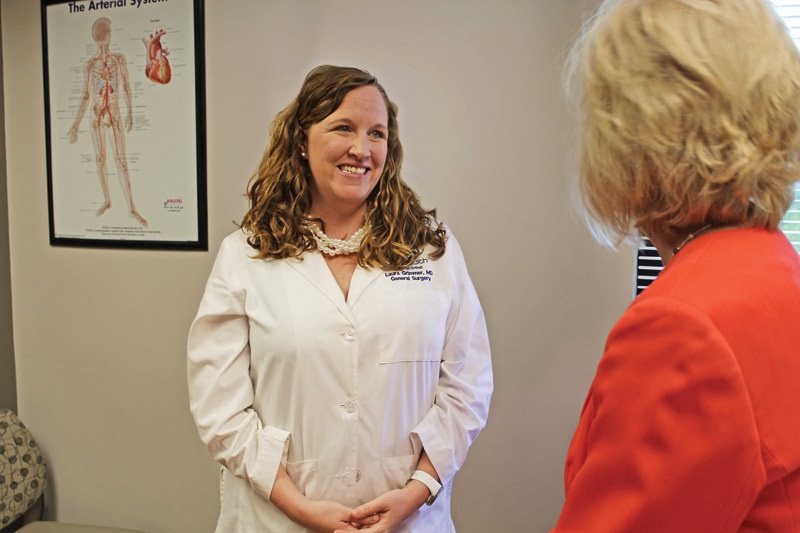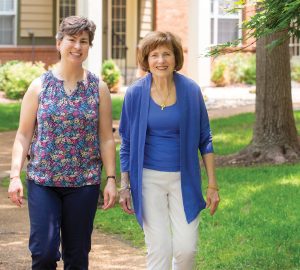It’s estimated that 20 percent of adults in the U.S. suffer from acid reflux, a condition with uncomfortable symptoms like heartburn, chest pain, difficulty swallowing and regurgitation of food or liquid. Known medically as GERD (gastroesophageal reflux disease), it causes sphincter muscles at the top of the stomach to weaken, according to SSM Health surgeon Dr. Laura Grimmer. Digestive acid then leaks backward and irritates the lining of the esophagus.
Some GERD patients also have a chronic cough, laryngitis, asthma or trouble sleeping; occasionally, regurgitated stomach acid even enters the lungs. The condition may worsen because of stress, medication, diet, smoking, pregnancy and other factors, says Grimmer, who sees patients at SSM Health St. Mary’s Hospital. Common diet triggers include fried and fatty foods, citrus fruits, chocolate, coffee, alcohol and carbonated drinks. If GERD goes untreated, it can lead to ulcers, scarring or esophageal cancer in some people.
 A new minimally invasive surgical procedure called LINX, an alternative to acid suppression drugs, is offering patients relief. LINX places a flexible ring around the bottom of the esophagus to help the sphincter muscles stay closed when they’re supposed to, and open when food passes through. The procedure is permanent, and the quarter-sized ring is made of smooth titanium beads with magnetic cores so it can expand and contract like an elastic bracelet. “Its job is to strengthen the sphincter,” Grimmer explains. “The procedure was approved by the FDA in 2012 and is steadily being adopted by more practices. St. Mary’s is the second hospital to offer it in St. Louis.”
A new minimally invasive surgical procedure called LINX, an alternative to acid suppression drugs, is offering patients relief. LINX places a flexible ring around the bottom of the esophagus to help the sphincter muscles stay closed when they’re supposed to, and open when food passes through. The procedure is permanent, and the quarter-sized ring is made of smooth titanium beads with magnetic cores so it can expand and contract like an elastic bracelet. “Its job is to strengthen the sphincter,” Grimmer explains. “The procedure was approved by the FDA in 2012 and is steadily being adopted by more practices. St. Mary’s is the second hospital to offer it in St. Louis.”
First, doctors run lab, endoscopy and manometry (esophageal muscle function) tests to determine if LINX is the right choice for the patient. If so, they perform the procedure through four small incisions in the abdomen. Most patients can go home the same day and eat a normal diet, Grimmer says. For a week after the procedure, they need to eat more often to keep the ring moving and flexing. Otherwise, there are no lifestyle restrictions, she notes.
Other GERD surgeries involve manipulation and dissection of the esophagus and stomach, and they often take longer to perform and heal from, Grimmer explains. And according to the manufacturer, the LINX device doesn’t interfere with MRI tests or airport metal detectors.
“I’ve been doing reflux surgeries for a long time, but I never had the condition myself until I became pregnant,” she recalls. “It’s no joke! It gave me a new understanding of what my patients were going through.” Reflux often happens temporarily in pregnancy because of shifting organs in the abdomen, she says.
Recent LINX studies show that most patients have no heartburn symptoms three years after the procedure, Grimmer adds. “Many people don’t want to be on acid-suppressing drugs for the rest of their lives,” she says. “Ninety percent of LINX patients never need them again.”
SSM Health Provides comprehensive care for gastroesophageal reflux disease patients. Pictured on the cover: SSM Health surgeon Dr. Laura Grimmer. For more information, call 314.925.4770 or visit ssmhealth.com.
Cover design by Julie Streiler
Cover photo by Tim Parker Photography
Pictured above: Dr. Laura Grimmer advises a patient.








